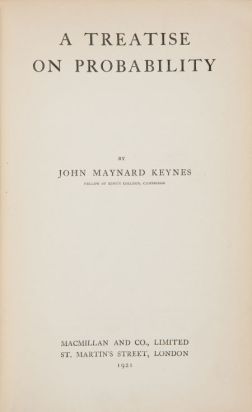From Lars Syll As Oskar Morgenstern noted already back in his 1928 classic Wirtschaftsprognose: Eine Untersuchung ihrer Voraussetzungen und Möglichkeiten, economic predictions and forecasts amount to little more than intelligent guessing. Making forecasts and predictions obviously isn’t a trivial or costless activity, so why then go on with it? The problems that economists encounter when trying to predict the future really underlines how important it is for social sciences to incorporate Keynes’s far-reaching and incisive analysis of induction and evidential weight in his seminal A Treatise on Probability (1921). According to Keynes we live in a world permeated by unmeasurable uncertainty – not quantifiable stochastic risk – which often forces us to make decisions based on anything
Topics:
Lars Pålsson Syll considers the following as important: Uncategorized
This could be interesting, too:
tom writes The Ukraine war and Europe’s deepening march of folly
Stavros Mavroudeas writes CfP of Marxist Macroeconomic Modelling workgroup – 18th WAPE Forum, Istanbul August 6-8, 2025
Lars Pålsson Syll writes The pretence-of-knowledge syndrome
Dean Baker writes Crypto and Donald Trump’s strategic baseball card reserve
from Lars Syll
 As Oskar Morgenstern noted already back in his 1928 classic Wirtschaftsprognose: Eine Untersuchung ihrer Voraussetzungen und Möglichkeiten, economic predictions and forecasts amount to little more than intelligent guessing.
As Oskar Morgenstern noted already back in his 1928 classic Wirtschaftsprognose: Eine Untersuchung ihrer Voraussetzungen und Möglichkeiten, economic predictions and forecasts amount to little more than intelligent guessing.
Making forecasts and predictions obviously isn’t a trivial or costless activity, so why then go on with it?
The problems that economists encounter when trying to predict the future really underlines how important it is for social sciences to incorporate Keynes’s far-reaching and incisive analysis of induction and evidential weight in his seminal A Treatise on Probability (1921).
According to Keynes we live in a world permeated by unmeasurable uncertainty – not quantifiable stochastic risk – which often forces us to make decisions based on anything but ‘rational expectations.’ Keynes rather thinks that we base our expectations on the confidence or ‘weight’ we put on different events and alternatives.  To Keynes, expectations are a question of weighing probabilities by ‘degrees of belief,’ beliefs that often have preciously little to do with the kind of stochastic probabilistic calculations made by the rational agents as modelled by ‘modern’ social sciences. And often we “simply do not know.”
To Keynes, expectations are a question of weighing probabilities by ‘degrees of belief,’ beliefs that often have preciously little to do with the kind of stochastic probabilistic calculations made by the rational agents as modelled by ‘modern’ social sciences. And often we “simply do not know.”
How strange that social scientists and mainstream economists, as a rule, do not even touch upon these aspects of scientific methodology that seems to be so fundamental and important for anyone trying to understand how we learn and orient ourselves in an uncertain world. An educated guess on why this is a fact would be that Keynes concepts are not possible to squeeze into a single calculable numerical ‘probability.’ In the quest for measurable quantities, one puts a blind eye to qualities and looks the other way.
So why do companies, governments, and central banks, continue with this more or less expensive, but obviously worthless, activity?
A part of the answer concerns ideology and apologetics. Forecasting is a non-negligible part of the labour market for (mainstream) economists, and so, of course, those in the business do not want to admit that they are occupied with worthless things (not to mention how hard it would be to sell the product with that kind of frank truthfulness). Governments, the finance sector and (central) banks also want to give the impression to customers and voters that they, so to say, have the situation under control (telling people that next years x will be 3.048 % makes wonders in that respect). Why else would anyone want to pay them or vote for them? These are sure not glamorous aspects of economics as a science, but as a scientist, it would be unforgivably dishonest to pretend that economics doesn’t also perform an ideological function in society.
